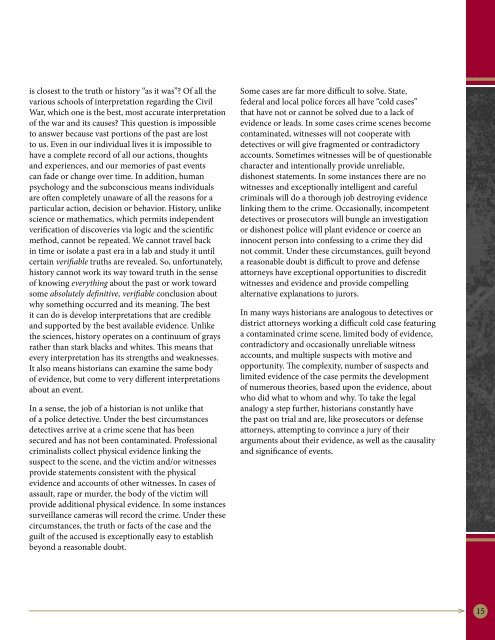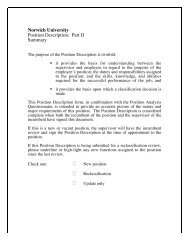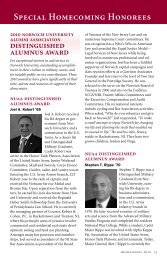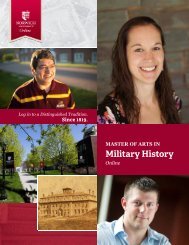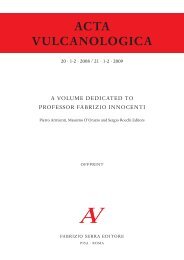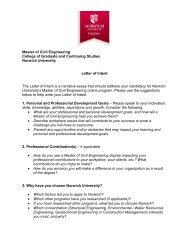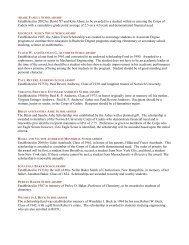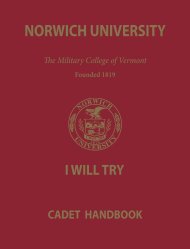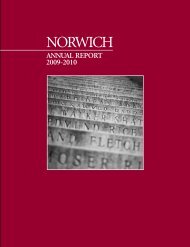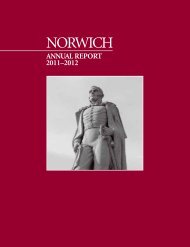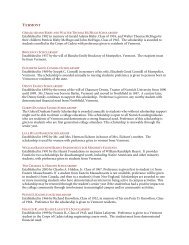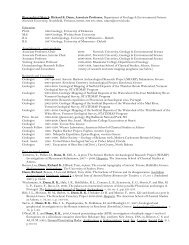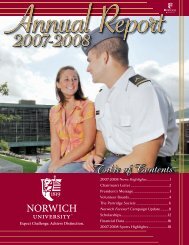In the 1930s and early 1940s, yet another school orinterpret<strong>at</strong>ion of the Civil War emerged. This wasthe “revisionist school” 5 and this interpret<strong>at</strong>ion wasinfluenced by disillusionment with the experience andconsequences of the First World War and the rise oftotalitarianism in the interwar period. This interpret<strong>at</strong>ionargued th<strong>at</strong> the Civil War could have been avoided andthe differences between the sections were not so gre<strong>at</strong> orintractable as to make war inevitable. Revisionists tendedto blame extremists, politicians th<strong>at</strong> chose to exacerb<strong>at</strong>ethe sectional conflict for political gain, and a gener<strong>at</strong>ionth<strong>at</strong> allowed itself to be led by rabble rousers. Revisioniststended to see all wars as avoidable and th<strong>at</strong> war itselfwas a social p<strong>at</strong>hology. Obviously the perceptionsof the “revisionist” school were colored by the deepdisillusionment with the results of the First World Warand influenced by a pacifist outlook th<strong>at</strong> characterizedthe political culture of the democracies in the 1920sand 1930s.With the experience of the Second World War and theevil epitomized by the Axis, some historians in the 1940sbegan to reject the arguments and assumptions of the“revisionist school.” While accepting th<strong>at</strong> war was horribleand evil they argued th<strong>at</strong> under certain circumstancesit could be the lesser of two evils. Historians of this erabelieved nothing other than war could have destroyedNazi Germany or Imperial Japan. In examining the CivilWar, these historians saw the conflict as both inevitableand just because no other method could have destroyedslavery and reunified the country. This understandingabout the n<strong>at</strong>ure of war in general and the Civil War inparticular also found support in the early Cold War asthe n<strong>at</strong>ion confronted the evils of communism and builta powerful military force capable of going to war <strong>at</strong> amoment’s notice.In the 1950s and 1960s, the historiography of theCivil War continued to evolve. Some of the best worksin this era resist classific<strong>at</strong>ion as their sophistic<strong>at</strong>edinterpret<strong>at</strong>ions of the war synthesized the mostconvincing aspects of the n<strong>at</strong>ionalist, Progressive,revisionist, and post-revisionist arguments. With theexplosion of sub-fields and the hyper-specializ<strong>at</strong>ionof the historical field in the 1960s, scholars began toexamine the impact of political ideology, party systems,voting behavior, religious, cultural and ethnic issuesand utilized quantit<strong>at</strong>ive methods to examine wh<strong>at</strong>factors may or may not have led to the Civil War.The main point of this basic outline of thehistoriography of the Civil War is to point out th<strong>at</strong>history is not st<strong>at</strong>ic, but an evolving field of inquiry.<strong>History</strong> is not only influenced by the concerns andperspectives of the present, but also by how we weighand perceive a variety of evidence. Each gener<strong>at</strong>ion ofhistorians will look back on the past and interpret itsmeaning. The deb<strong>at</strong>e about the meaning, significance,and causality of historical events will continue until theend of human civiliz<strong>at</strong>ion.A review of the historiography of the Civil War shouldalso raise important and perhaps unsettling questionsregarding objectivity and truth. The concept of truthis a tricky thing in the history profession. Historianscertainly distinguish truth, or right or wrong, whenit comes to facts. The Japanese <strong>at</strong>tacked Pearl Harbor,not the Germans, and a mountain of documents,physical evidence and eyewitness accounts provethe Holocaust did indeed occur. An event eitherhappened or it did not. The difficult part comes withinterpret<strong>at</strong>ion. Certainly historians should rejectsources or interpret<strong>at</strong>ions th<strong>at</strong> are suspect, fictional orbased upon suspect evidence. However, in investig<strong>at</strong>ingthe past is it possible to determine wh<strong>at</strong> interpret<strong>at</strong>ion145The term “revisionist history” usually has a very ugly connot<strong>at</strong>ion in popular culture. Often this is used as a criticism of an interpret<strong>at</strong>ionth<strong>at</strong> does not conform to one’s particular political ideology or cherished “historical memory” or belief. Historians use the word in a muchdifferent context. Because history is an ongoing deb<strong>at</strong>e about the meaning and significance of the past, our understanding and perceptionof the past is constantly being revised. Revisions also occur when significant new evidence about the past is unearthed. For example in the1970s, our understanding of many aspects of the Second World War was revised when the N<strong>at</strong>ional Archives released documents revealingthe Allies had succeeded in breaking the codes of Nazi Germany and Imperial Japan. Our understanding of the war on the Eastern Frontwas also revised when, upon the fall of the Soviet Union, scholars were granted access to Soviet military archives. For historians, revision is agood thing and contributes to our understanding of the past and the deb<strong>at</strong>e about its meaning and significance. In a sense, each gener<strong>at</strong>ion ofhistorians are revisionists because the significance and meaning of the past is under constant scrutiny.
is closest to the truth or history “as it was”? Of all thevarious schools of interpret<strong>at</strong>ion regarding the CivilWar, which one is the best, most accur<strong>at</strong>e interpret<strong>at</strong>ionof the war and its causes? This question is impossibleto answer because vast portions of the past are lostto us. Even in our individual lives it is impossible tohave a complete record of all our actions, thoughtsand experiences, and our memories of past eventscan fade or change over time. In addition, humanpsychology and the subconscious means individualsare often completely unaware of all the reasons for aparticular action, decision or behavior. <strong>History</strong>, unlikescience or m<strong>at</strong>hem<strong>at</strong>ics, which permits independentverific<strong>at</strong>ion of discoveries via logic and the scientificmethod, cannot be repe<strong>at</strong>ed. We cannot travel backin time or isol<strong>at</strong>e a past era in a lab and study it untilcertain verifiable truths are revealed. So, unfortun<strong>at</strong>ely,history cannot work its way toward truth in the senseof knowing everything about the past or work towardsome absolutely definitive, verifiable conclusion aboutwhy something occurred and its meaning. The bestit can do is develop interpret<strong>at</strong>ions th<strong>at</strong> are credibleand supported by the best available evidence. Unlikethe sciences, history oper<strong>at</strong>es on a continuum of graysr<strong>at</strong>her than stark blacks and whites. This means th<strong>at</strong>every interpret<strong>at</strong>ion has its strengths and weaknesses.It also means historians can examine the same bodyof evidence, but come to very different interpret<strong>at</strong>ionsabout an event.In a sense, the job of a historian is not unlike th<strong>at</strong>of a police detective. Under the best circumstancesdetectives arrive <strong>at</strong> a crime scene th<strong>at</strong> has beensecured and has not been contamin<strong>at</strong>ed. Professionalcriminalists collect physical evidence linking thesuspect to the scene, and the victim and/or witnessesprovide st<strong>at</strong>ements consistent with the physicalevidence and accounts of other witnesses. In cases ofassault, rape or murder, the body of the victim willprovide additional physical evidence. In some instancessurveillance cameras will record the crime. Under thesecircumstances, the truth or facts of the case and theguilt of the accused is exceptionally easy to establishbeyond a reasonable doubt.Some cases are far more difficult to solve. St<strong>at</strong>e,federal and local police forces all have “cold cases”th<strong>at</strong> have not or cannot be solved due to a lack ofevidence or leads. In some cases crime scenes becomecontamin<strong>at</strong>ed, witnesses will not cooper<strong>at</strong>e withdetectives or will give fragmented or contradictoryaccounts. Sometimes witnesses will be of questionablecharacter and intentionally provide unreliable,dishonest st<strong>at</strong>ements. In some instances there are nowitnesses and exceptionally intelligent and carefulcriminals will do a thorough job destroying evidencelinking them to the crime. Occasionally, incompetentdetectives or prosecutors will bungle an investig<strong>at</strong>ionor dishonest police will plant evidence or coerce aninnocent person into confessing to a crime they didnot commit. Under these circumstances, guilt beyonda reasonable doubt is difficult to prove and defense<strong>at</strong>torneys have exceptional opportunities to discreditwitnesses and evidence and provide compellingaltern<strong>at</strong>ive explan<strong>at</strong>ions to jurors.In many ways historians are analogous to detectives ordistrict <strong>at</strong>torneys working a difficult cold case fe<strong>at</strong>uringa contamin<strong>at</strong>ed crime scene, limited body of evidence,contradictory and occasionally unreliable witnessaccounts, and multiple suspects with motive andopportunity. The complexity, number of suspects andlimited evidence of the case permits the developmentof numerous theories, based upon the evidence, aboutwho did wh<strong>at</strong> to whom and why. To take the legalanalogy a step further, historians constantly havethe past on trial and are, like prosecutors or defense<strong>at</strong>torneys, <strong>at</strong>tempting to convince a jury of theirarguments about their evidence, as well as the causalityand significance of events.15


